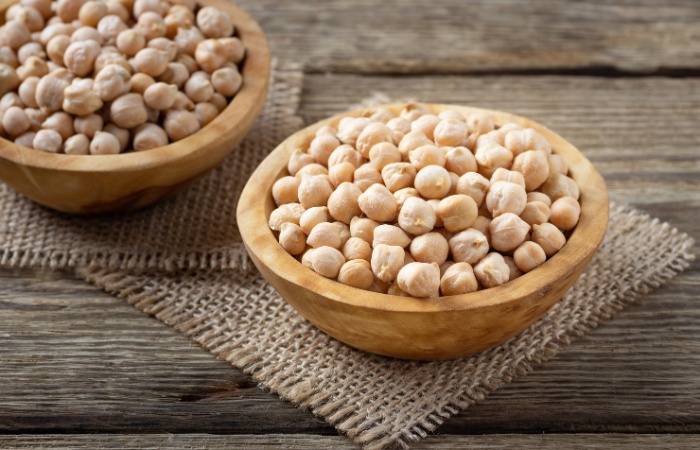Why Are Nutrient Dense Foods Important?

Have you ever heard the saying, “You are what you eat”? It turns out that this old adage might have some truth to it. The food we consume can significantly impact our overall health and well-being, so it’s important to pay attention to the nutrients we’re putting into our bodies.
Nutrient-dense foods, in particular, offer a wide range of health benefits that can help to promote a better quality of life. But what exactly are nutrient-dense foods, and why are nutrient dense foods important?
Typically, nutrient-dense foods are high in essential vitamins, minerals, and other nutrients compared to their calorie content. These foods provide the body with essential vitamins, minerals, and other nutrients that help promote better health, improve energy levels, increase immunity, aid in weight management, and improve digestion.
In this blog, we’ll explore the answers to these questions and examine the many health benefits of eating nutrient-dense foods.
What Are Exactly Nutrient-Dense Foods?
Nutrient-dense foods are rich in essential nutrients, such as vitamins, minerals, protein, and healthy fats, while also being relatively low in calories. Examples include leafy greens, colorful fruits and vegetables, lean meats, beans and legumes, nuts and seeds, brown rice, and sweet potatoes. Nutrient-dense foods benefit overall health and can help reduce the risk of chronic diseases, such as heart disease and obesity, compared to consuming energy-dense foods high in sugar and unhealthy fats.
Why Are Nutrient Dense Foods Important?
Nutrient-dense foods provide a high amount of essential nutrients per calorie. These foods contain vitamins, minerals, and other beneficial nutrients that support optimal health. Consuming nutrient-dense foods can provide several benefits for your overall well-being.
Better Health
Eating nutrient-dense foods can promote better health by reducing the risk of several chronic diseases, including heart disease, diabetes, and cancer.
- Nutrient-dense foods such as fruits, vegetables, and lean meats are low in saturated and trans fats, which can reduce the risk of heart disease.
- Foods high in fiber, such as beans, brown rice, and cereals, can help regulate blood sugar levels and reduce the risk of type 2 diabetes.
- Antioxidant-rich foods like leafy greens, sweet potatoes, and berries can help protect against cancer by neutralizing free radicals.
Improved Energy Levels
Nutrient-dense foods can help improve energy levels by providing the necessary nutrients for optimal bodily function.
- Foods high in protein, such as meat, fish, and beans, can provide sustained energy and help build and repair tissues.
- Foods rich in complex carbohydrates, such as brown rice and whole-grain bread, can provide a steady energy source throughout the day.
- Vitamin B12 in animal products can help boost energy levels and improve cognitive function.
Increased Immunity
Eating nutrient-dense foods can support a healthy immune system by providing essential vitamins and minerals.
- Vitamin C in citrus fruits and leafy greens can help boost the immune system and protect against infections.
- Vitamin D, found in fatty fish and fortified products, can help regulate the immune system and reduce the risk of autoimmune diseases.
- Zinc in lean meats and beans can help support immune function and promote wound healing.
Weight Management
Consuming nutrient-dense foods can aid in weight management by providing essential nutrients while limiting calorie intake.
- Nutrient-dense foods can provide a feeling of fullness and satisfaction, reducing the likelihood of overeating.
- Foods high in fiber and protein can help regulate appetite and promote weight loss.
- Nutrient-dense foods like vegetables and fruits can be incorporated into meals as low-calorie substitutes for less healthy options.
Better Digestion
Eating nutrient-dense foods can promote better digestion and gut health by providing fiber and beneficial nutrients.
- Constipation can be prevented by eating foods that are rich in fiber, such as fruits, vegetables, and whole grains.
- Fermented foods like yogurt and kefir can provide beneficial bacteria that support gut health.
- Nutrient-dense foods like leafy greens and beans can promote a healthy gut microbiome and reduce inflammation.
How to Incorporate Nutrient-Dense Foods into Your Diet?
Incorporating nutrient-dense foods into your diet is a great way to improve overall health and reduce the risk of chronic diseases. Nutrient-dense foods provide a high amount of essential nutrients, such as vitamins, minerals, protein, and fiber, with their calorie content. Nutrition-dense foods can be incorporated into your diet in five ways:
1. Choose Nutrient-Dense Foods
One of the easiest ways to incorporate nutrient-dense foods into your diet is to choose them over less nutritious options. For example, instead of eating processed snacks like chips or candy, opt for fresh fruit, raw veggies with hummus, or a handful of nuts. Choose whole-grain products like brown rice or whole-wheat bread instead of refined grains like white rice or white bread.
2. Add Variety to Your Meals
Eating a variety of nutrient-dense foods is important to ensure you get all the essential nutrients your body needs. Incorporate a wide range of fruits, vegetables, lean meats, beans, and whole grains into your meals. Experiment with new recipes and cuisines to keep your meals interesting and flavorful.
3. Focus on Whole Foods
Whole foods, such as fruits, vegetables, whole grains, lean meats, and beans, are great choices for a nutrient-dense diet. They are minimally processed and provide a wide range of essential nutrients. Limit your intake of processed foods, such as packaged snacks, cereals, and frozen dinners, as they are high in sugar, salt, and unhealthy fats.
4. Get Creative with Recipes
Incorporating nutrient-dense foods into your meals can be fun and delicious. Experiment with new recipes with nutrient-dense ingredients like leafy greens, sweet potatoes, and beans. Try swapping out traditional ingredients with healthier options, such as using Greek yogurt instead of sour cream or baking with applesauce instead of butter.
5. Track Your Progress
Tracking your progress can be a helpful tool to stay motivated and ensure that you are making progress toward your goals. Consider keeping a food diary or using a food tracking app to monitor your intake of nutrient-dense foods. You can also track your weight and measurements to see how your diet affects your overall health.
Read Also: Why Is It Important To Reduce Food Waste?
Nutrient-Dense Foods and Specific Populations
Nutrient-dense foods provide a high amount of nutrients in proportion to their calorie content. These foods are essential for maintaining good health and reducing the risk of chronic diseases. However, certain populations require a more specific nutrient-dense diet to meet their unique nutritional needs.
- Pregnant and Lactating Women: Pregnant and lactating women require a higher intake of vitamins and minerals to support the growth and development of the fetus and newborn. Nutrient-dense foods such as eggs, leafy greens, lean meat, and nuts are good sources of protein, iron, folate, and omega-3 fatty acids.
- Children: Children require a nutrient-dense diet to support their growth and development. Foods like fruits, vegetables, whole grains, and lean proteins are rich in vitamins and minerals necessary for bone and muscle growth, brain development, and a strong immune system.
- Older Adults: Older adults may have difficulty absorbing certain nutrients, making it important to consume nutrient-dense foods. Foods such as dairy products, fatty fish, fortified cereals, and leafy greens are good sources of calcium, vitamin D, and B vitamins.
- Athletes: Athletes require a nutrient-dense diet to support their physical activity and recovery. Foods such as lean proteins, complex carbohydrates, and healthy fats are essential for building and repairing muscles, providing energy, and reducing inflammation.
- Vegetarians and Vegans: Vegetarians and vegans may have difficulty meeting their nutrient needs, especially for iron, zinc, calcium, and vitamin B12. Nutrient-dense plant-based foods such as lentils, beans, tofu, nuts, seeds, and fortified foods can help meet these needs.
Final Thoughts
So the question remains, why are nutrient dense foods important? The answer is simple; they are necessary for healthy living and can help to reduce the risk of developing several chronic diseases.
Nutrient dense foods help to provide us with the nutrients we need to maintain a healthy body, as well as aid in the prevention of chronic diseases.
These foods are packed with essential vitamins and minerals, providing various health benefits. They are also low in calories, meaning they can be consumed in greater quantities without gaining extra weight.




